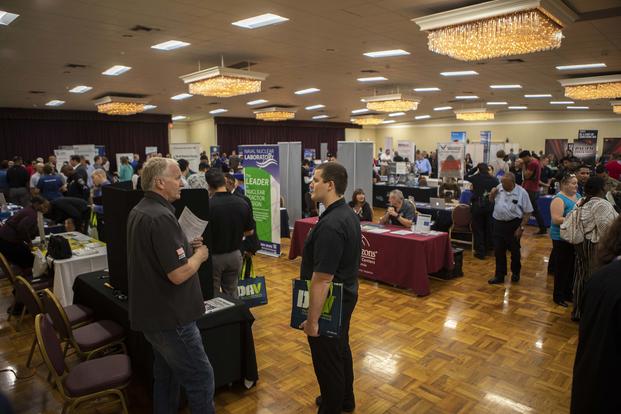Unemployment claims for the third week of March soared to 3.28 million, a staggering and unprecedented tenfold increase from the previous week as the novel coronavirus pandemic wrecked what had been a booming economy, the Labor Department reported.
Initial claims were 3,283,000 for the week ending March 21, the Labor Department's Bureau of Labor Statistics (BLS) said in a Twitter post ahead of the release of the full report, which could signal a return to the double-digit jobless rates of the Great Recession of 2008 for veterans.
"We know it's coming, everybody does," Thomas Porter, executive vice president at Iraq and Afghanistan Veterans of America, told Military.com last week when BLS put the total of initial claims at 280,000.
As historically bad as the BLS numbers were, they may not even reflect the scope of the pandemic's impact, which has shut down much of the economy and the American way of life.
Related: Navy Boot Camp Trainers Must Spend 90 Days Away from Families in Lockdown Measure
Many part-time and low-wage workers, as well as the workforce of the so-called "gig economy" of independent contractors and temporary employees, don't qualify for unemployment benefits.
In addition, unemployment offices in several states have reported being unable to handle the crush of calls and applications as systems crashed.
The BLS numbers were a shock even for the analysts who had been predicting a major spike in claims.
"In the whole history of initial claims, there's never been anything remotely close to that," Ben Herzon, executive director of the business data firm IHS Markit, said of the huge uptick in claims, The New York Times reported.
The average unemployment benefit check currently averages about $385 a week, depending on the state. But the checks could get a significant boost, assuming the House passes the massive $2 trillion stimulus bill in a vote expected Friday and President Donald Trump then signs it into law.
The weekly checks would rise by $600 a week under the version of the bill passed by the Senate.
The worst-ever week for unemployment claims recorded by the government is of particular concern for veterans service organizations, which warned of bleak prospects for the post-9/11 generation now in the military who were planning to retire or leave active duty.
To ease the challenge for transitioning service members, American Legion officials are pressing for the service branches to give troops the option of extending for six to 12 months to allow the job market to recover.
"We're definitely concerned with those numbers" coming out of BLS, which will strain Legion resources, said Joe Sharpe, the Legion's director of employment. "And we anticipate they'll get worse."
"Our first concern is with the active-duty [service members]" leaving the military, said Sharpe, a 31-year Army veteran who retired as a sergeant 1st Class in 2014. "What happens to them?"
"A lot of the service members leaving the military every month don't have a job lined up to go to," said Ariel DeJesus, assistant employment director at the Legion.
Giving those individuals the option of extending for six to 12 months would give them time to prepare and adjust, said DeJesus, who retired as a Marine gunnery sergeant in 2010 after 21 years of service.
Only last week, in a supplement to its unemployment claims report, the BLS said overall veteran unemployment rates through 2019 basically tracked the 50-year lows for the general population of 3.5%.
However, the post-9/11 generation of vets had an unemployment rate of 4.5 percent through 2019, BLS said.
In its last monthly unemployment rate for February, before the impact from the pandemic could be gauged, BLS said that the general unemployment rate stood at 3.5%, a tick below the 3.6% rate in January.
The jobless rate for all veterans was 3.6% in February, compared to 3.5% in January. As is usually the case, the rates for post-9/11 veterans were higher. The unemployment rate in February for post-9/11 veterans was 4.5%, compared to 4.4% in January, BLS said.
The unemployment rates for veterans and everyone else are expected to spike when BLS issues its jobs reports for the month of March next week, said Brian Rollins, head of the Warriors to Work team at the Wounded Warrior Project.
"We haven't seen a huge surge" in calls for assistance thus far, "but it's expected," Rollins said.
On the list of employers that Wounded Warrior tracks, about two-thirds said they are still hiring. "But that was last week," he added.
Surveys of the WWP membership showed that about 11% reported looking for work, "and those are all 9/11 veterans," Rollins said.
"We do expect to see an impact in that regard" on post-9/11 veterans when BLS reports on the unemployment rates for March, he said.
-- Richard Sisk can be reached at Richard.Sisk@Military.com.














